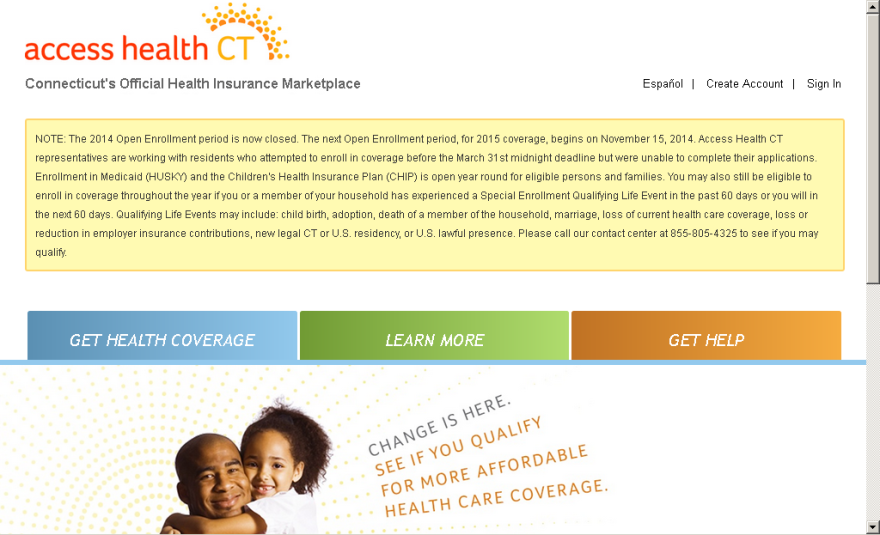Connecticut Governor Dannel Malloy was in Washington Tuesday to discuss the state's rollout of the Affordable Care Act.
Speaking at a Center for American Progress event, Malloy touted Connecticut’s success in enrolling 208,000 people in plans through its online exchange, more than doubling its goal.
“We did 19,000 hours of preparation with our navigators to make sure that they were ready, Malloy said. “We reached out to the existing insurance industry and made sure that they were comfortable with what we were doing.”
Malloy says by December, 30,000 people had enrolled in health insurance plans through Access Health CT after the website’s launch in October. But the Democrat adds initial success dropped off.
“The reality is a lot of people stopped using us for a period of time because they bought into the national news that was so terribly negative,” the Democrat explained. “So we had to confront that with a fair amount of advertising to drive people back to our site particularly after the first couple of days of success when it was falling apart everywhere else.”
Neighboring Massachusetts is one of the states that has struggled with the rollout of ACA, recently announcing it will purchase an off-the-shelf software program and utilize the federal healthcare website after the Massachusetts Health Connector failed to allow people to complete applications. Under a $120 million plan, the commonwealth will purchase hCentive, which has powered exchanges in Colorado and Kentucky, while it negotiates out of its contract with website developer CGI Group. Jean Yang is executive director of the Massachusetts Health Connector.
“It’s a tested commercialized, end-to-end solution,” she said. “Whereas the system that we had been relying on CGI to build, even though it had the original vision of offering end-to-end solutions successfully, it didn’t happen. So as of today, not only is it missing key functionality, but the pieces that are deployed have serious issues in terms of the quality and its performance.”
Meanwhile, Connecticut is nearing a deal to share its computer code with Maryland after the state scrapped its website. Connecticut eventually hopes to sell its success by offering consulting services and software developed by the firm Deloitte to other states. Malloy says that trend could grow.
“You are probably going to see a more regional approach which I was in favor of from the beginning,” Malloy said. “Groupings of states to work it out. I think that people are going to go to the technologies that have proven themselves to work as opposed to perhaps trying to save ones that were failures.”
But the success may be costing Connecticut. WNPR reports Connecticut could pay the company that runs its call centers nearly double what it anticipated. The state reports the company, Maximus, has had to triple staffing because of higher enrollment numbers. The state expects to pay about $22 million in the first two years of what was expected to be a three-year, $15 million contract. Even though Massachusetts passed its own groundbreaking healthcare law in 2006 and had little success with ACA, Malloy says Connecticut may have benefited from its previous extension of Medicaid to more than 41,000 single adults earning less than 55 percent of the poverty rate.
“So we learned a fair amount in those transactions,” Malloy said. “Understanding the magnitude of the work necessary to help people who are in that situation sign up for something like Medicaid. I think we had more experience.”
Malloy says the expanded coverage will decrease future costs by detecting and treating conditions that people wouldn’t have received care for. Malloy says the 26 states that haven’t extended Medicaid as of the end of March will see the benefits in those that did.
“How’s it going to play out in Mississippi which has much higher diabetes rates and much higher smoking rates than Connecticut does?” Malloy said. “How’s it going to play out in Alabama? Much higher diabetes rates. Much higher smoking rates. How’s it going to play out there? How’s the non-treatment working for you folks?”









